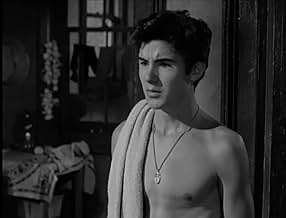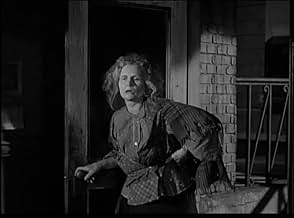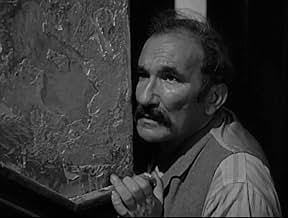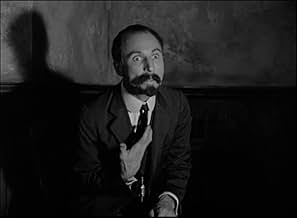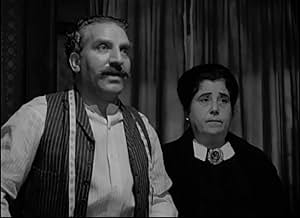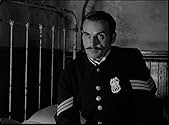Johnny Columbo s'envole pour New York depuis l'Italie afin de retrouver un criminel surnommé "la main noire", lequel a assassiné le père de Johnny il y a quelques années.Johnny Columbo s'envole pour New York depuis l'Italie afin de retrouver un criminel surnommé "la main noire", lequel a assassiné le père de Johnny il y a quelques années.Johnny Columbo s'envole pour New York depuis l'Italie afin de retrouver un criminel surnommé "la main noire", lequel a assassiné le père de Johnny il y a quelques années.
- Réalisation
- Scénario
- Casting principal
Eleonora von Mendelssohn
- Maria Columbo
- (as Eleonora Mendelssohn)
Avis à la une
Remarkable only for the presence of Gene Kelly, this decidedly no-dancing 1949 drama purports to tell how a New York Mafia protection racket was smashed in the early 1900s. Kelly appears to have made it in between On the Town and Summer Stock, and possibly welcomed the chance to do some serious acting, though this never was his forte, and there are moments when you half expect him to start hoofing and warbling!
Kelly plays the part of a young man whose Italian father has been killed by the Black Hand gang years before, and is seeking revenge, initially by direct action with a knife, but later by legal means, though at the end of the day he has to use the knife any way. The film as a whole is variable, with some plausible dramatic scenes, but with others straight out of a Keystone Kops comedy, including some set in Naples. J Carrol Naish has a major role as an Italian-American detective, and a little romantic interest for Kelly is provided by Teresa Celli.
Kelly plays the part of a young man whose Italian father has been killed by the Black Hand gang years before, and is seeking revenge, initially by direct action with a knife, but later by legal means, though at the end of the day he has to use the knife any way. The film as a whole is variable, with some plausible dramatic scenes, but with others straight out of a Keystone Kops comedy, including some set in Naples. J Carrol Naish has a major role as an Italian-American detective, and a little romantic interest for Kelly is provided by Teresa Celli.
Black Hand (1950)
Sandwiched between his many superb musicals, this straight up drama has Gene Kelly playing an Italian returning home to find out who murdered his father years before. It's very well made—crisp writing and editing, excellent acting, and a kind of mise-en-scene that seems about right for bustling New York.
The pressure Italian mobsters press onto their own neighborhood Italian store owners and merchants is terrible and maddening, of course, and here we are made to feel it as directly as a movie can manage. Besides Kelly, two other actors are just superlative—J. Carol Naish, playing the police detective who eventually goes to Italy to find evidence, and the store owner (whose name I can't find in a hurry). Oddly, both Naish and Kelly are Irish-Americans playing Italians in early 20th Century New York.
The plot is a bit forced, as this kind of large social-issue movie usually ends up doing. The mob (known as the Black Hand) is making life miserable for average folk, and whenever one resists, they end up dying or almost. But somebody has to do something about this, so between the cops (some Italian, some not) and the heroics of one individual (played by Kelly), the thugs are brought down one little notch.
But if you go along with inevitable victory of the little guy over the forces of evil, you'll see a really finely made drama with terrific acting (Kelly is no slouch and Naish is brilliant) and excellent filming (almost inevitable in lat 1940s American cinema). There are lots of other characters, a few chilling scenes, some dreamy idealism, and in all a look at the times with only a slight filter over the harsher reality that is, always, the truth.
Sandwiched between his many superb musicals, this straight up drama has Gene Kelly playing an Italian returning home to find out who murdered his father years before. It's very well made—crisp writing and editing, excellent acting, and a kind of mise-en-scene that seems about right for bustling New York.
The pressure Italian mobsters press onto their own neighborhood Italian store owners and merchants is terrible and maddening, of course, and here we are made to feel it as directly as a movie can manage. Besides Kelly, two other actors are just superlative—J. Carol Naish, playing the police detective who eventually goes to Italy to find evidence, and the store owner (whose name I can't find in a hurry). Oddly, both Naish and Kelly are Irish-Americans playing Italians in early 20th Century New York.
The plot is a bit forced, as this kind of large social-issue movie usually ends up doing. The mob (known as the Black Hand) is making life miserable for average folk, and whenever one resists, they end up dying or almost. But somebody has to do something about this, so between the cops (some Italian, some not) and the heroics of one individual (played by Kelly), the thugs are brought down one little notch.
But if you go along with inevitable victory of the little guy over the forces of evil, you'll see a really finely made drama with terrific acting (Kelly is no slouch and Naish is brilliant) and excellent filming (almost inevitable in lat 1940s American cinema). There are lots of other characters, a few chilling scenes, some dreamy idealism, and in all a look at the times with only a slight filter over the harsher reality that is, always, the truth.
After his father is murdered for standing up to the mob Johnny Columbo swears to avenge his death. Well entrenched in Little Italy the Mafia uses violence and intimidation to keep the community in its grip and Columbo finds it difficult at first to get assistance in breaking the code of silence that solidify's their grip. When he enlists the help of detective Louis Lorelli things begin to happen and the mob responds harshly.
Gene Kelly in an off type role as Johnny is a slight stretch (it begs for Richard Conti) but convincing enough. It is J. Carroll Naish as intrepid detective Lorelli though that runs away with the film. It's nice to see J. center stage and noble given his career as a venal and craven weakling in many of his films hanging on the edge of scenes, ready to pounce on someone's misfortune.
Workman like director Richard Thorpe more than once allows his scenes to drag in spots but cinematographer Paul Vogels excellent camera work fills the suspense lapses with excellently lit exteriors and some nice subtle tracking work. There are Lang like moments as well with Thorpe eschewing suspense music in favor of silence and ambient noise to heighten scenes but his poor pacing and moments of incredulity prevent the film from reaching full potential.
There is certainly more ugly truth to be found in the film Black Hand that deals with the same topic of the Mafia as the more sophisticated violently romantic Godfather films. Pale in comparison to the production values, vaunted cast and and directing styles of the saga it still delivers moments that rival.
Gene Kelly in an off type role as Johnny is a slight stretch (it begs for Richard Conti) but convincing enough. It is J. Carroll Naish as intrepid detective Lorelli though that runs away with the film. It's nice to see J. center stage and noble given his career as a venal and craven weakling in many of his films hanging on the edge of scenes, ready to pounce on someone's misfortune.
Workman like director Richard Thorpe more than once allows his scenes to drag in spots but cinematographer Paul Vogels excellent camera work fills the suspense lapses with excellently lit exteriors and some nice subtle tracking work. There are Lang like moments as well with Thorpe eschewing suspense music in favor of silence and ambient noise to heighten scenes but his poor pacing and moments of incredulity prevent the film from reaching full potential.
There is certainly more ugly truth to be found in the film Black Hand that deals with the same topic of the Mafia as the more sophisticated violently romantic Godfather films. Pale in comparison to the production values, vaunted cast and and directing styles of the saga it still delivers moments that rival.
With its scenes of extortion and murder in the Italian-American community of Manhattan's Lower East Side at the turn of the century, The Black Hand inevitably calls to mind the flashbacks to young Vito Corleone's start in The Godfather, Part II. And while it's far from that league, there's much in The Black Hand to admire.
Eight years after the murder of his father, an Italian immigrant, for daring to oppose the criminal organization called The Black Hand (the script also calls it The Mafia and The Comorra), young Gene Kelly returns to New York to pursue his vendetta. With the help of police detective J. Carrol Naish, he tries to organize the tenement neighborhood to resist the reign of intimidation and terror. But the mob has moles who anticipate and thwart his every move. When Naish travels to Naples on the case, he's killed, but not before mailing an envelope of incriminating photos to Kelly. But the little brother of Kelly's girlfriend (Teresa Celli) is kidnapped, with the envelope serving as ransom....
Among the movie's admirable points are the thoughtful, rather restrained script and foreboding nightscapes, both in New York and Naples, which lend the film a noirish tinge (as do a couple of adroitly staged moments of suspense). But the story occasionally rambles off into rhetoric about the exploitation of the immigrant underclass by politicians and police valid points, but not presented dramatically. Another dramaturgical shortcoming is that the many characters haven't been sufficiently individuated, leaving a generic ethnic muddle. The romantic angle is oddly subdued, too. The Black Hand shows signs of an interesting and ambitious production that nonetheless falls somewhat short of what it might have been.
Eight years after the murder of his father, an Italian immigrant, for daring to oppose the criminal organization called The Black Hand (the script also calls it The Mafia and The Comorra), young Gene Kelly returns to New York to pursue his vendetta. With the help of police detective J. Carrol Naish, he tries to organize the tenement neighborhood to resist the reign of intimidation and terror. But the mob has moles who anticipate and thwart his every move. When Naish travels to Naples on the case, he's killed, but not before mailing an envelope of incriminating photos to Kelly. But the little brother of Kelly's girlfriend (Teresa Celli) is kidnapped, with the envelope serving as ransom....
Among the movie's admirable points are the thoughtful, rather restrained script and foreboding nightscapes, both in New York and Naples, which lend the film a noirish tinge (as do a couple of adroitly staged moments of suspense). But the story occasionally rambles off into rhetoric about the exploitation of the immigrant underclass by politicians and police valid points, but not presented dramatically. Another dramaturgical shortcoming is that the many characters haven't been sufficiently individuated, leaving a generic ethnic muddle. The romantic angle is oddly subdued, too. The Black Hand shows signs of an interesting and ambitious production that nonetheless falls somewhat short of what it might have been.
When I think of Gene Kelly, I think of "Singing in the Rain" or "An American in Paris," as I imagine most would. I would never expect to see him playing an Italian who comes back from the old country to avenge the death of his father. Casting him as an Italian was way off base. They couldn't find an Italian to play an Italian? This miscasting affects the whole movie.
You should not look for something that resembles "The Godfather" here as there is a similar revenge story. This was done in 1950 and people were obviously more gullible. Imagine that he was able to pick up a lit cigarette with his feet and use it to light a fuse. Imagine that he could do that, without even imagining the fact that he did it in a room full of people. Incredible! The one redeeming part of the movie was the part played by J. Carrol Naish, as a police detective who figures out a way to beat the mob.
Of interest as the predecessor to the films that we all love today about the Mafia.
You should not look for something that resembles "The Godfather" here as there is a similar revenge story. This was done in 1950 and people were obviously more gullible. Imagine that he was able to pick up a lit cigarette with his feet and use it to light a fuse. Imagine that he could do that, without even imagining the fact that he did it in a room full of people. Incredible! The one redeeming part of the movie was the part played by J. Carrol Naish, as a police detective who figures out a way to beat the mob.
Of interest as the predecessor to the films that we all love today about the Mafia.
Le saviez-vous
- AnecdotesThis was originally set up as a Robert Taylor vehicle.
- Versions alternativesoriginal story about Lt. Petrosino,real NYC police officer, remade as Pay or Die with Ernest Borgnine
Meilleurs choix
Connectez-vous pour évaluer et suivre la liste de favoris afin de recevoir des recommandations personnalisées
- How long is Black Hand?Alimenté par Alexa
Détails
- Durée
- 1h 32min(92 min)
- Couleur
- Rapport de forme
- 1.37 : 1
Contribuer à cette page
Suggérer une modification ou ajouter du contenu manquant

